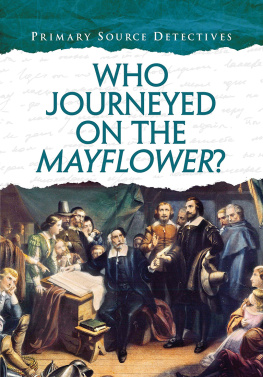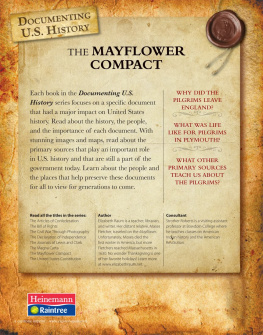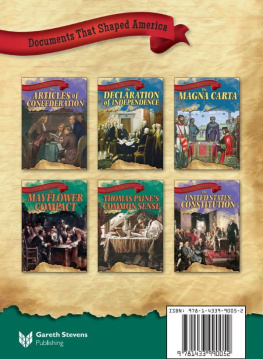THE
MAYFLOWER
AND HER LOG
JULY 15, 1620MAY 6, 1621
CHIEFLY FROM ORIGINAL SOURCES
By
AZEL AMES
WITH THE ESSAY
The Myth of the "Mayflower"
BY G. K. CHESTERTON
First published in 1901
Copyright 2020 Read & Co. History
This edition is published by Read & Co. History,
an imprint of Read & Co.
This book is copyright and may not be reproduced or copied in any
way without the express permission of the publisher in writing.
British Library Cataloguing-in-Publication Data
A catalogue record for this book is available
from the British Library.
Read & Co. is part of Read Books Ltd.
For more information visit
www.readandcobooks.co.uk
To
My Soundest Critic,
My most Patient Reader,
My Best Incentive,
My most Loyal Friend,
My Wife,
Descended from many
May-Flower Pilgrims and worthy of her Lineage,
This volume is affectionately inscribed.
THE MYTH
OF THE MAYFLOWER
By G. K. Chesterton
AGNOSTICISM, the ancient confession of ignorance, was a singularly sane and healthy thing so far as it went. Unfortunately it has not gone as far as the twentieth century. It has declared in all ages, as a heathen chief declared in the dark ages, that the life of a man is like the flight of a bird across a firelit room, because we know nothing of whence it comes or whither it goes. It would seem natural to apply it not only to man but to mankind. But the moderns do not apply the same principle but the very opposite principle. They specialize in the unknown origins and in the unknown future. They dwell on the prehistoric and on the post-historic or prophetic; and neglect only the historic. They will give a most detailed description of the habits of the bird when he was a sort of pterodactyl only faintly to be traced in a fossil. They will give an equally detailed description of the habits of the bird a hundred years hence, when he shall have turned into a super-bird, or the dove of universal peace. But the bird in the hand is worth far less to them than the two mysterious birds in these two impenetrable bushes. Thus they will publish a portrait with life, letters, and tabletalk of the Missing Link, although he is missing; they will publish a plan and documented history of how the Social Revolution happened, though it has not happened yet. It is the men who are not missing and the revolutions that have happened that they have rather a habit of overlooking. Anyone who has argued, for instance, with the young Jewish intellectuals who are the brain of Bolshevism knows that their whole system turns on the two pivots of the prehistoric and the prophetic. They talk of the Communism of prehistoric ages as if it were a thing like the Crusades in the Middle Ages; not even a probable conjecture but a proved and familiar fact. They will tell you exactly how private property arose in primitive times, just as if they had been there. And then they will take one gigantic leap over all human history, and tell you about the inevitable Communism of the future. Nothing seems to matter unless it is either new enough to be foretold or old enough to b e forgotten.
Mr. H. G. Wells has hit off his human habit in the account of a very human character, the American girl who glorifies Stonehenge in his last novel. I do not make Mr. Wells responsible for her opinions, though she is an attractive person and much too good for her Lothario. But she interests me here because she typifies very truly another variation upon this same tendency. To the prehistoric and the post-historic must be added a third thing, which may be called the unhistoric. I mean the bad teaching of real history that such intelligent people so often suffer. She sums up exactly what I mean when she says humorously that Stonehenge has been kept from her, that Notre Dame is far less important, and that this is the real starting-point of the Mayflower.
Now the Mayflower is a myth. It is an intensely interesting example of a real modern myth. I do not mean of course that the Mayflower never sailed, any more than I admit that King Arthur never lived or that Roland never died. I do not mean that the incident had no historic interest, or that the men who figured in it had no heroic qualities; any more than I deny that Charlemagne was a great man because the legend says he was two hundred years old; any more than I deny that the resistance of Roman Britain to the heathen invasion was valiant and valuable, because the legend says that Arthur at Mount Badon killed nine hundred men with his own hand. I mean that there exists in millions of modern minds a traditional image or vision called the Mayflower, which has far less relation to the real facts than Charlemagnes two hundred years or Arthurs nine hundred corpses. Multitudes of people in England and America, as intelligent and sympathetic as the young lady in Mr. Wells novel, think of the Mayflower as an origin or archetype like the Ark or at least the Argo. Perhaps it would be an exaggeration to say that they think the Mayflower discovered America. They do really talk as if the Mayflower populated America. Above all, they talk as if the establishment of New England had been the first and formative example of the expansion of England. They believe that English expansion was a Puritan experiment; and that an expansion of Puritan ideas was also the expansion of what have been claimed as English ideas, especially ideas of liberty. The Puritans of New England were champions of religious freedom, seeking to found a newer and freer state beyond the sea, and thus becoming the origin and model of modern democracy. All this betrays a lack of exactitude. It is certainly nearer to exact truth to say that Merlin built the castle at Camelot by magic, or that Roland broke the mountains in pieces with his unb roken sword.
For at least the old fables are faults on the right side. They are symbols of the truth and not of the opposite of the truth. They described Roland as brandishing his unbroken sword against the Moslems, but not in favour of the Moslems. And the New England Puritans would have regarded the establishment of real religious liberty exactly as Roland would have regarded the establishment of the religion of Mahound. The fables described Merlin as building a palace for a king and not a public hall for the London School of Economics. And it would be quite as sensible to read the Fabian politics of Mr. Sidney Webb into the local kingships of the Dark Ages, as to read anything remotely resembling modern liberality into the most savage of all the savage theological frenzies of the seventeenth century. Thus the Mayflower is not merely a fable, but is much more false than fables generally are. The revolt of the Puritans against the Stuarts was really a revolt against religious toleration. I do not say the Puritans were never persecuted by their opponents; but I do say, to their great honour and glory, that the Puritans never descended to the hypocrisy of pretending for a moment that they did not mean to persecute their opponents. And in the main their quarrel with the Stuarts was that the Stuarts would not persecute those opponents enough. Not only was it then the Catholics who were proposing toleration, but it was they who had already actually established toleration in the State of Maryland, before the Puritans began to establish the most intolerant sort of intolerance in the State of New England. And if the fable is fabulous touching the emancipation of religion, it is yet more fabulous touching the expansion of empire. That had been started long before either New England or Maryland, by Raleigh who started it in Virginia. Virginia is still perhaps the most English of the states, certainly more English than New England. And it was also the most typical and important of the states, almost up to Lees last battle in the Wilderness. But I have only taken the Mayflower as an example of the general truth; and in a way the truth has its consoling side. Modern men are not allowed to have any history; but at least nothing can prevent men from hav ing legends.

















